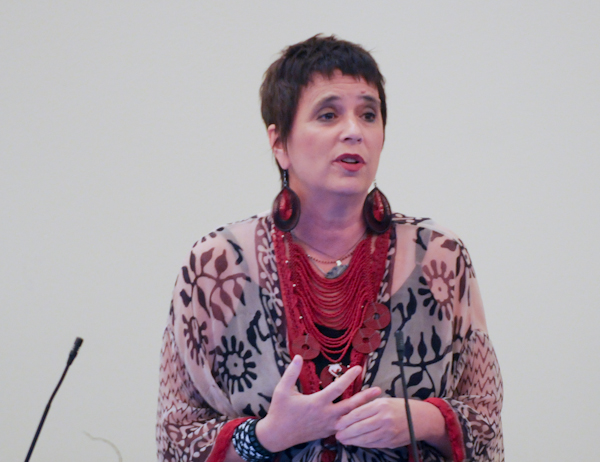“Every single day I ask one question: how do we end violence against women and girls?” said Tony Award-winning playwright Eve Ensler Thursday evening to a crowd of over 200 at Paul Brest Hall. “This is the central issue of our time. Women are the carriers of lives; to undermine or hurt women is to destroy the future.”
Ensler wrote The Vagina Monologues, which — since first performed in 1997 — has been translated into over 48 languages and performed in over 140 countries. In 1998, Ensler founded the V-Day movement, a global activist movement aimed at ending violence toward women by raising public awareness and partnering with local organizations worldwide.
In the last 11 years, the V-Day movement has raised over $85 million.

Ensler said that she was inspired to begin her work in part because of “the consequence of violence, trauma and cruelty in my life that I experienced as a child.”
At Stanford, students host an annual V-Week, with a performance of The Vagina Monologues as the cornerstone of the weekend-long event. This year, the program will be held from April 18 to 20.
“Her work has been transformative in changing conceptions about female sexuality, female empowerment and the role that violence plays in women’s lives around the world,” said Viviana Arcia ‘13, president of the Stanford’s Women Coalition, which was a co-sponsor of the event.
“And that is the mission of Stanford V-Week — increasing awareness of violence against women and empowering female sexuality,” Arcia added. “Stanford fits into the mission of V-Day and Vagina Monologues because sexual and intimate partner violence does occur on this campus and it is a significant problem in our community.”
Leslie Brian ‘12, president of V-Week at Stanford, introduced Ensler as someone who “envisions a planet where women can thrive rather than just survive.”
Ensler started her talk by reflecting on the growing level of social activism for women worldwide.
“This year we will have over 5,300 V-Day events in 2,000 places from Stanford to Qatar,” Ensler said.
Recently, V-Day partnered with UNICEF to open the City of Joy, a rehabilitation center built for and by survivors of sexual violence in the Congo.
Ensler said building the center was “ a crazy thing to do, but everything V-Day does is crazy.”
Ensler said that her work addressing the situation in the Congo, where over half a million women have been raped, tortured and abused, “lives in the center of [her] heart.”
“I will never be the same,” Ensler said. “When you witness that kind of atrocity, you are responsible for responding,” she said. “The Congo is one of the great failings of the century, and we are allowing it to go on. Remember that a lot of our cell phones and luxury goods can be traced to mines in the Congo.”
Ensler emphasized the role of theater in human rights and women’s empowerment, explaining how it can spark personal discovery, activate people and change consciousness.
She said that one billion women alive now will be raped or beaten in their lifetime.
“Violence is the bulwark of patriarchy and sexism,” Ensler said. “There is an ongoing message to women that if you are too free, too sexual or too powerful, you will be hurt, raped and murdered.”
Addressing those who join her in her movement, Ensler said, we must “stop apologizing for our intensity.”
She criticized large governmental and international institutions for being patriarchal and fixed, arguing that change will have to rise from the people on the ground.
According to Ensler, men can and should play a role in helping end gender-based violence.
“Think of your mothers, wives and sisters,” Ensler said. “Men are not making [violence against women] their business and their outrage.”
Ensler closed with the piece “Refuser” from her new novel, “I am an Emotional Creature: The Secret Life of Girls Around the World.” The reading electrified the audience, which gave her a standing ovation.
Some audience members shared their personal experiences and thanked Ensler for her inspiration, while others asked questions concerning how men view masculinity and the role of being a woman in today’s modernized world.
“I’ve read a couple of her books in the past and as amazing as they are, I was totally unprepared for how powerful it would be to witness her in person,” said audience member Lily Steyer ‘15. “After hearing her talk, I understand how she, even as just one woman, was able to start a global movement — she’s that inspiring.”